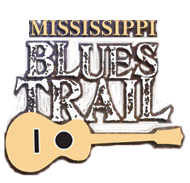Ralph Lembo
Ralph Lembo - Itta Bena
Music dealer, promoter and talent scout Ralph Lembo (1897-1960) was a pioneer in providing recording opportunities for musicians in the Delta, including the Mississippi Sheiks, Rubin Lacy, Bukka White, Charley Patton and Sonny Boy Williamson No. 2 (Rice Miller). Lembo, a Sicilian immigrant who became a prominent Itta Bena citizen with multiple business interests as a merchant and landowner, owned stores here in Itta Bena and operated others in Greenwood and some surrounding communities.
Ralph Lembo has been internationally acclaimed among music historians for his seminal role in recording Mississippi blues and gospel artists, and locally he was also noted for his community involvement and varied business interests. When he was only in his early twenties, the Greenwood Commonwealth praised Lembo as “a clever and prosperous Itta Bena merchant.”
Born Raffaele Lembo in Comiso, Sicily, he arrived with his mother and siblings in Itta Bena in 1910 to join and work with his father, a grocer who had immigrated in 1904. He gave his birth date as June 28, 1897, when he applied for U.S. citizenship, but the date on the headstone placed by his family is June 24, 1898. Accustomed to hard work from an early age, according to family lore, Lembo established a series of retail enterprises, marketing groceries, dry goods, furniture, musical instruments, phonographs, radios and records. He also promoted boxing bouts, led his own bands, and managed his young son Frank’s dancing career. Lembo invested in cotton plantations and in local buildings and businesses at various times, including the Dixie Theater, the Streamline Café and several jukebox companies.
Amidst his many endeavors Lembo developed relationships with several national record labels, including Columbia, Victor, OKeh, Paramount and Artophone, and began working with prospective recording artists by 1927. The Commonwealth reported: “This is the first time that any one from the Mississippi Delta has engaged in the making of phonograph records.” Lembo arranged for them to record blues, spirituals, and sermons in various locations and sometimes accompanied them to sessions. His full recording resume may never be known, as record company files of the era rarely credited local talent scouts or artists’ managers, but it included Booker T. Washington (“Bukka”) White, Rubin Lacy, the Mississippi Sheiks and Napoleon Hairston (as well as George “Bullet” Williams, many historians believe). Sonny Boy Williamson No. 2 also said he recorded in 1929 in Itta Bena for Lembo, who had equipment to make demo recordings at his store, but discographers have never located those records. Some have speculated that Lembo may have been involved in Charley Patton’s recording debut in 1929, and also may have had a hand in enabling some country musicians to record. Lembo also booked performances in Itta Bena or Greenwood by a variety of performers, including blues recording icons Jim Jackson, Mississippi John Hurt and Blind Lemon Jefferson.
With the onset of the Depression, Delta blues and gospel recording activity went into decline, but the introduction of jukeboxes provided a new revenue stream for Lembo, his longtime friend and partner Joe Glorioso, and other associates. Lembo remained a prominent planter, and Mississippi Vocational College, the historically black college now known as Mississippi Valley State University, was built in 1950 primarily on a tract of plantation land Lembo sold in 1948. Lembo, recalled for his hearty demeanor and lifelong Sicilian accent, died on September 26, 1960. He was laid to rest in the Itta Bena Cemetery on Highway 7 (Schley Street).
content © Mississippi Blues Commission
[ BACK TO TOP ]

